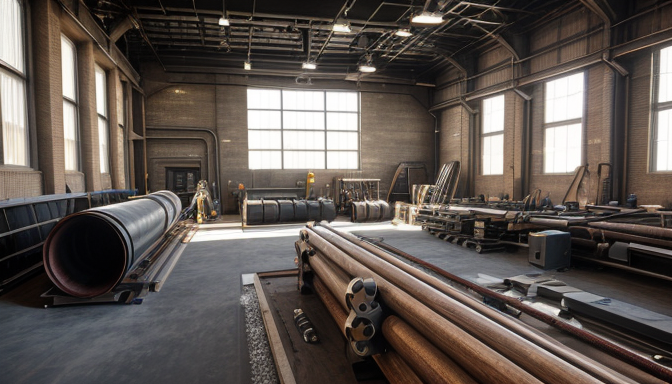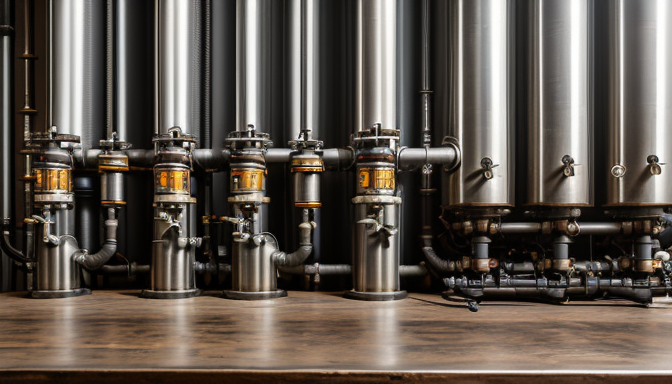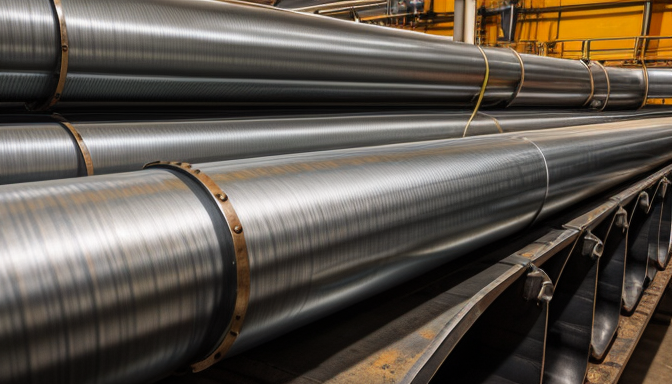When it comes to industrial applications, steel boiler pipes play a crucial role. They are not just ordinary pipes; they are the backbone of many systems that require high-pressure steam and hot water. Whether you’re in manufacturing, power generation, or any sector that relies on heat transfer, understanding these pipes is essential.
So, what makes steel boiler pipes so important? First off, their design is tailored for extreme conditions. They can handle high temperatures and pressures, making them indispensable in boilers and heat exchangers. Imagine trying to transport steam at high pressure through flimsy tubing—disastrous, right? That’s where the strength of steel comes into play.
But let’s get into the nitty-gritty. Steel boiler pipes are made from various grades of steel, which contributes to their performance. The selection of steel grade affects everything from corrosion resistance to thermal conductivity. When you choose the right pipe, you’re not just picking a piece of metal; you’re ensuring the efficiency and safety of your entire system. It’s like choosing the right tool for a job. You wouldn’t use a hammer when you need a screwdriver, would you?
Now, let’s talk about the size and weight of these pipes. The weight of steel boiler pipes can vary significantly based on their diameter and wall thickness. This is crucial when it comes to transportation and installation. Heavy pipes may require special handling equipment, while lighter options can be easier to work with. But remember, lighter doesn’t always mean better. You need to consider the specific requirements of your project. It’s all about finding that perfect balance.
In terms of pricing, steel boiler pipes can be influenced by various factors. Market trends, material costs, and specific project requirements all play a role. If you’re budgeting for a project, it’s wise to keep an eye on these factors. Prices can fluctuate, and understanding the market can save you money in the long run. Think of it as shopping for groceries. Prices can change based on the season, and knowing when to buy can make a big difference.
In conclusion, steel boiler pipes are not just a commodity; they are a vital component in many industrial applications. Their strength, durability, and ability to withstand harsh conditions make them essential for efficient operations. When selecting steel boiler pipes, consider the properties, sizes, and prices carefully. It’s a decision that can impact your entire project. So, whether you’re a seasoned professional or new to the industry, understanding these pipes is key to your success.
Steel Boiler Pipe Price
Understanding the pricing factors of steel boiler pipes is crucial for budgeting projects. Prices can fluctuate, and knowing what influences these changes can save you a lot of headaches. For instance, market trends play a significant role. When demand is high, prices tend to rise. Conversely, when supply exceeds demand, prices may drop. It’s like the weather; sometimes it’s sunny, sometimes it’s stormy. You just have to be prepared.
Another factor is the material costs. Steel prices can vary based on global supply and demand, production costs, and even political factors. When raw materials become scarce, you can expect prices to climb. It’s essential to stay updated on these trends. After all, you don’t want to be caught off guard when it’s time to make a purchase.
Different specifications also impact overall pricing. For example, the thickness, length, and diameter of the pipes can significantly affect costs. Thicker pipes may be more expensive due to the additional material used. Here’s a quick breakdown:
| Specification | Price Range (per foot) |
|---|---|
| Standard Thickness | $5 – $10 |
| Heavy-Duty Thickness | $10 – $15 |
| Custom Sizes | Varies |
When you’re looking to buy, it’s wise to compare prices from different suppliers. It’s like shopping for groceries; you want to find the best deal without compromising on quality. Don’t hesitate to ask for quotes and negotiate prices. You might be surprised at how much you can save.
In summary, the price of steel boiler pipes is influenced by various factors, including market trends, material costs, and specifications. Keeping an eye on these elements can help you make informed decisions and keep your project on budget. So, whether you’re a contractor or a DIY enthusiast, knowing the ins and outs of pricing can be your secret weapon.

Steel Boiler Pipe Weight
The weight of steel boiler pipes is a key factor that cannot be overlooked. Why? Well, it plays a significant role in both transportation and installation. Imagine trying to lift a heavy pipe; it’s not just about the strength of the material but also about how manageable it is. If the pipes are too heavy, they can complicate logistics and lead to increased costs.
When considering the weight, several aspects come into play. First, the diameter and thickness of the pipe largely determine its overall mass. For instance, a larger diameter means more material, which translates to more weight. Similarly, thicker walls not only increase durability but also add to the heft. This can be crucial in planning for equipment that will handle these pipes.
To give you a clearer picture, let’s break down the weight of steel boiler pipes by their dimensions. Below is a simple table that illustrates typical weights based on common sizes:
| Pipe Diameter (inches) | Wall Thickness (inches) | Weight (lbs per foot) |
|---|---|---|
| 2 | 0.154 | 6.63 |
| 3 | 0.216 | 11.24 |
| 4 | 0.237 | 16.51 |
| 6 | 0.280 | 26.57 |
As you can see from the table, the weight varies considerably. This variation can affect how you handle the pipes during installation. Lifting heavy pipes requires more manpower and equipment, increasing the overall project cost. Additionally, if the weight is not factored in, it could lead to structural issues later on.
Another point to consider is transportation. Heavier pipes can lead to higher shipping costs. If you’re on a budget, every pound counts. It’s essential to calculate the total weight when ordering materials to ensure you’re prepared for the logistics involved.
In summary, the weight of steel boiler pipes is not just a number; it’s a crucial element that impacts various stages of a project. From planning and budgeting to installation and maintenance, understanding the weight can help you make informed decisions. So next time you’re dealing with steel boiler pipes, remember to factor in the weight. It might just save you time and money!
Steel Boiler Pipe Properties
When it comes to steel boiler pipes, understanding their properties is key. Why? Because these pipes are not just ordinary tubes; they are designed to handle extreme conditions. Think of them as the unsung heroes of industrial applications. They work tirelessly under pressure, transporting steam and hot water in boiler systems. So, what makes these pipes so special?
First off, let’s talk about tensile strength. This is a fancy term for how much force a material can withstand while being stretched or pulled. Steel boiler pipes boast high tensile strength, which means they can handle high pressures without bursting. Imagine trying to stretch a rubber band to its limit. If you pull too hard, it snaps. But a steel pipe? It holds strong, making it perfect for high-pressure environments.
Next on the list is corrosion resistance. Steel, by nature, can rust when exposed to moisture. However, steel boiler pipes often come with protective coatings or are made from alloys that resist corrosion. This property is crucial because it ensures the pipes remain durable over time, even in harsh environments. Picture a knight in shining armor; that’s your steel boiler pipe, ready to face the elements.
Another important property is thermal conductivity. This refers to how well a material conducts heat. Steel boiler pipes have excellent thermal conductivity, which means they can efficiently transfer heat from the boiler to the water or steam. This is vital for maintaining the right temperatures in industrial processes. Think of it like a good conductor in a symphony—everything flows smoothly when they do their job well.
To sum it up, here are the key properties of steel boiler pipes:
- Tensile Strength: High resistance to stretching and pulling forces.
- Corrosion Resistance: Ability to withstand rust and deterioration.
- Thermal Conductivity: Efficient heat transfer capabilities.
These properties make steel boiler pipes a reliable choice for industries that rely on high-pressure systems. Whether it’s in power plants, chemical factories, or even large commercial buildings, these pipes are essential for efficient operation. So, the next time you see a steel boiler pipe, remember, it’s not just a pipe; it’s a vital component designed for durability and performance.

Steel Boiler Pipe Sizes
When it comes to steel boiler pipes, choosing the right size is crucial. Think of it as picking the perfect pair of shoes. Too tight, and you’re uncomfortable; too loose, and they won’t serve their purpose. In industrial applications, the right size ensures efficiency and safety. So, how do you determine the best fit for your needs?
Steel boiler pipes come in various sizes, which can be categorized based on their diameter and wall thickness. The most common measurements you’ll encounter are nominal pipe sizes (NPS) and schedule numbers. For example, a pipe with a nominal size of 2 inches might have different wall thicknesses depending on its schedule. This affects not just the pipe’s strength but also its capacity to handle pressure.
Here’s a simple breakdown:
| Nominal Pipe Size (NPS) | Outer Diameter (OD) in inches | Wall Thickness (Schedule 40) in inches |
|---|---|---|
| 1 | 1.315 | 0.133 |
| 2 | 2.375 | 0.154 |
| 3 | 3.500 | 0.216 |
| 4 | 4.500 | 0.237 |
Understanding these measurements is key. For instance, if you’re working on a high-pressure system, you’ll want pipes that can withstand the stress. Thicker walls mean more strength. On the other hand, lighter pipes are easier to handle during installation. But remember, lighter doesn’t always mean better. You need to balance weight with strength.
Another important aspect is the application. Are you using these pipes for steam, water, or gas? Each application may have specific size requirements. For example, steam pipes often need larger diameters to accommodate the flow. It’s like trying to drink a thick milkshake through a straw that’s too small—it just won’t work!
In conclusion, selecting the right size of steel boiler pipes is not just a matter of convenience; it’s about ensuring safety and efficiency in your projects. Always consider the application, pressure requirements, and the physical properties of the materials involved. By doing this, you’ll set your project up for success.
Frequently Asked Questions
- What factors influence the price of steel boiler pipes?
The price of steel boiler pipes can vary significantly based on several factors. Material costs, market demand, and the specific specifications of the pipes all play a crucial role. For instance, higher grades of steel or specialized coatings can increase the price. It’s essential to stay updated on market trends to budget effectively for your projects.
- How does the weight of steel boiler pipes affect their installation?
The weight of steel boiler pipes is a critical factor during transportation and installation. Heavier pipes require more robust support structures and can complicate handling. It’s essential to consider the weight when planning your installation to ensure safety and efficiency. Lighter pipes may be easier to manage but could have different performance characteristics.
- What are the key properties of steel boiler pipes?
Steel boiler pipes are renowned for their unique properties that make them ideal for high-pressure applications. They exhibit excellent tensile strength, which allows them to withstand intense pressure without deforming. Additionally, they offer corrosion resistance and good thermal conductivity, making them suitable for various industrial settings where durability is paramount.
- What sizes are available for steel boiler pipes?
Choosing the right size of steel boiler pipes is crucial for optimal system performance. Standard sizes vary, but they typically range from small diameters for residential applications to large sizes for industrial use. It’s important to consult specifications and consider the specific requirements of your project to select the appropriate size.
- Can steel boiler pipes be customized?
Yes, steel boiler pipes can often be customized to meet specific project requirements. This includes alterations in size, thickness, and even the type of steel used. Customization ensures that the pipes will fit perfectly into your system and perform as expected, making it a worthwhile consideration for specialized applications.
